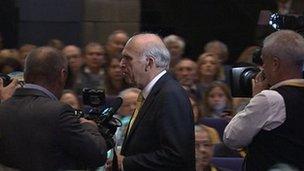Lib Dem conference: Clegg denies rift with Cable over economy
- Published

Vince Cable did turn up for part of the debate but did not sit alongside Nick Clegg and other ministers
Nick Clegg has denied suggestions of a rift with Vince Cable as the Lib Dem leadership saw off opposition to its economic strategy at its conference.
Activists backed the leadership plan of cutting the deficit, rejecting calls for changes to the Bank of England, and housing controls to promote growth and to distance themselves from the Tories.
The business secretary was expected to miss the debate but backed the plans.
Sources close to Mr Cable said talk of a row had been "massively overblown".
Although it was not binding on the government, Monday's debate was a clear indication of the mood of the party and will help shape the direction of economic policy in the run-up to the next election - scheduled for 2015.
'No complacency'
Nick Clegg: We lost public support but our membership figures are now stabilising.
Mr Cable has been more cautious about the state of the economy than most other ministers - including his party leader - warning that talk of a lasting recovery was premature and that it risked being derailed by another housing bubble and other factors.
His warnings have led Prime Minister David Cameron to call him a "Jeremiah" while former Lib Dem leader Sir Menzies Campbell has urged Mr Cable to be "less gloomy".
It was thought that Mr Cable would not vote for the leadership motion on the economy, which defends the party's achievements in government, including its austerity measures in the past three years, but urges more investment in housing and other areas.
But Mr Cable arrived in the conference hall one hour into the debate and voted for the leadership's position - although he did not sit alongside his party leader and other ministers.
Addressing activists, Mr Clegg said the Lib Dems' role in the coalition government did "not tie its hands" when it came to the next election and it would advocate distinct policies on taxation, spending, housing and employment.
'Be careful'
But he told party members : "Be careful what you wish for. If you start messing around with the big goalposts that we have stuck in the ground and which frame the stability required for further economic growth, we will destroy jobs and decrease prosperity."
Speaking earlier to the BBC, Mr Clegg said he agreed there was "no room for complacency" but the fact the economy was growing again was, in no small measure, due to the Lib Dems "holding their nerve" in the face of calls to change direction.
Asked about Mr Cable's participation, Mr Clegg said the matter was "a storm in a teacup". "He has made it quite clear that, of course, he supports the motion because, not least, he is in effect one of the co-authors of it," he told Radio 4's Today.
After the debate, Mr Cable told the BBC he was always planning to attend: "Why would I duck out of a big issue like that? I'm always up there and up front and I say what I think, so I turned up and indeed I wanted to support the motion, I wanted to support Nick Clegg."
The leadership was backed by a succession of ministers and prominent MPs, including party president Tim Farron - who said there was "nothing progressive about bottling out of hard decisions to stabilise our finances".
Watering down the government's economic strategy was "politically unwise" and the party should not "disown" it, he said.
'Distinctive'
But former MP Paul Holmes said the Lib Dems must put forward its own policies and warned it against "writing a coalition manifesto".
An amendment put forward by the Social Liberal Forum calling for the party to change the remit of the Bank of England to focus on jobs and living standards rather than just inflation, and for ministers to set a target for 300,000 new homes a year was defeated.
Backing the amendment, party member Naomi Smith accused Chancellor George Osborne of inflating the housing market with a "mortgages for votes" scheme and warned the Lib Dems against "an ideological merger" with the Tories' economic policy.
Dr Prateek Buch, one of the amendment's authors, said "coalition compromises" could not be the starting point for the party's 2015 policy and suggested the government's deficit reduction strategy needed to be more flexible.
"The pace of cuts and tax rises need to take account of what is happening in the real economy," he told the BBC News Channel.
In a question & answer session later, Mr Clegg said the Lib Dems "do not have to ask permission from George Osborne or anybody else" when they decide future policy - suggesting the party may push for the NHS and schools to be protected from cuts after the election.
The Lib Dem leader also restated that party policy was not to raise the top rate of tax back to 50p from the current 45p.
Ahead of a separate debate on tax, Mr Clegg said the party's emphasis was on trying to shift the burden of tax away from work and enterprise to those on assets, such as property.
However, a leaked briefing note for Lib Dem ministers suggested the party was looking to increase the contribution made by those earning more than £50,000, which it described as a "very large" salary.
- Published15 September 2013
- Published13 September 2013
- Published14 September 2013
- Published15 September 2013
- Published12 September 2013
- Published15 September 2013
- Published13 September 2013